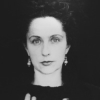Kiki Smith

Kiki Smith
Kiki Smithis a West German-born American artist whose work has addressed the themes of sex, birth and regeneration. Her figurative work of the late 1980s and early 1990s confronted subjects such as AIDS, gender and race, while recent works have depicted the human condition in relationship to nature. Smith lives and works in the Lower East Side neighborhood of New York City...
NationalityAmerican
ProfessionSculptor
Date of Birth18 January 1954
CityNuremberg, Germany
CountryUnited States of America
Source of inspiration. The MAK is a museum that has had a profound effect on me as an artist and art viewer.
I didn't start to be an artist myself until I was 24.
Prior to my father's death, I was having a hard time committing to a career as an artist, but that's not because of who he was - it was because of who I am. It's true, though, that I felt I shouldn't compete with him, and that those feelings went away after he died.
I like Betsy Ross as a model, too, the quilting bee, sitting around with your friends making art, asking what they think, so that you get the benefit of everyone's opinions and so it's not just about you in your you-dom.
I think a lot of making art is listening to yourself.
As a child I prayed that my calling be revealed - but not with expectation and not with a destination. I became an artist because I didn't know what to do and I thought it was really fun to make things.
In our family, there wasn't anything else besides art. Nothing else in the world existed. My father never spoke about going to a movie or listening to music, other than my mother's singing.
Artists live in unknown spaces and give themselves over to following something unknown.
Making art is a lot about just seeing what happens if you put some energy into something.
I think making things beautiful is important. But often what's first considered ugly is beautiful, too.
It’s one of my loose theories that Catholicism and art have gone well together because both believe in the physical manifestation of the spiritual world.
I like that feeling when you’re making art, that you’re taking the energy out of your body and putting it into a physical object. I like things that are labor-intensive : you make a little thing and another little thing and another little thing, and eventually you see a possibility.
Some people think or expect that you should make the same kinds of art forever because it creates a convenient narrative... I want my work to embody my inherent contradictions.
My work life makes much less sense now than 20 years ago. It's Humpty-Dumpty-like in a way; I can't put the pieces back together.